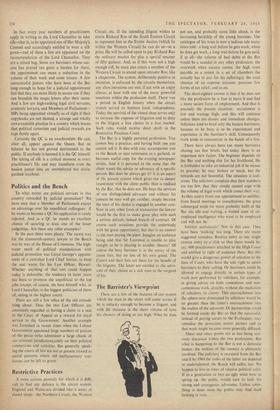Restrictive Practices
A more serious anomaly for which it is diffi- cult to find any defence is the circuit system. England and Wales.: are divided into a series of closed shops--the Northern Circuit, the Western Circuit, etc. If the intending litigant wishes to retain Richard Roe of the South Eastern Circuit to represent him at the Exeter Assizes (which lie within the Western Circuit) he can do so—at a price. He will be called upon to pay Richard Roe the ordinary market fee plus a special retainer of fifty guineas. And, as if this were not a high enough toll, he must also retain a member of the Western Circuit to attend upon intruder Roe, like a chaperone. The system, deliberately punitive in intention, is enforced by the circuits themselves; any alien intrusions are met, if not with an angry silence, at least with one of the many powerful sanctions within the profession itself. There was a period in English history when the circuit system served to buttress local independence. Today the survival of the closed shop serves only to increase the expense of litigation and to deny to the litigant a free choice in a free market. Such rules would receive short shrift in the Restrictive Practices Court.
The Bar is a highly personal profession. You cannot buy a practice, and having built one you cannot sell it. It dies with you, accompanies you to the Bench or into retirement as a garland, or becomes useful copy for the evening newspaper serials. And it is personal in the sense that the client wants the advice or advocacy of a specific person. But does he always get it? It is an aspect of the present system which gives rise to deeper resentment with the client public than is realised by the Bar, that he does not. He buys the services of one distinguished advocate and without his consent he may well get another, simply because the man of his choice is engaged in another case. Now in any other form of transaction the lawyer would be the first to make great play with such a serious default, indeed breach of contract. Of course such occasions provide the understudy with his great opportunity; but that is no answer to the man paying the piper. Imagine an audience being told that Sir Laurence is unable to play tonight as he is playing in another theatre! Of course the busy barrister is at the mercy of the cause lists, but no less of his own greed. The Courts and their lists are there for the benefit of the litigants. The latter are entitled to the advo- cate of their choice as a sick man to the surgeon of his.






































 Previous page
Previous page